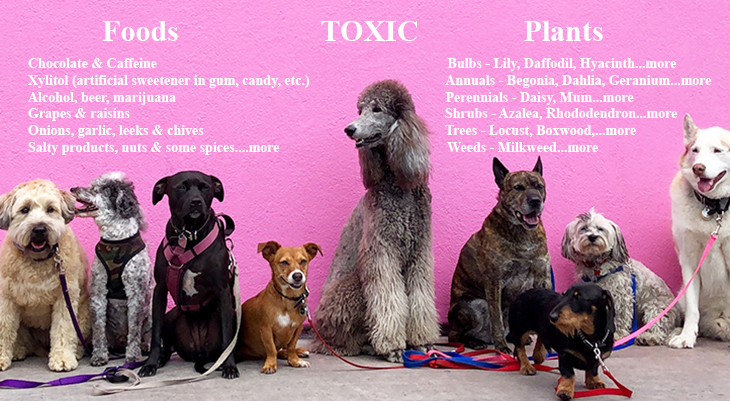Foods & Plants Toxic to Pets
Over 700 common house and garden plants (shrubs, trees, perennial and annual flowers), foods, and drinks, are dangerous or toxic to dogs, cats & other household animals.
 (Dogs Photo: Hannah Lim via Unsplash)
(Dogs Photo: Hannah Lim via Unsplash)
Use care with these items so you don’t drop or track them into areas where your pet may have access to them. What may be a small amount to a human could be a poisonous amount to a small cat, dog, or other animal.
Foods & Drinks Toxic to Pets
Store and dispose of these items securely, out of the reach of your dog, cat, or other pet, preferably in a high cupboard with a child-proof lock. One ounce is all it may take for lasting damage or death, depending on the size of the pet and toxicity of the substance ingested. Below is a list of some of the more common
- Caffeine & Chocolates – anything containing methylxanthines, which is found in chocolate and caffeine products such as coffee, tea, and soft drinks.
- Chocolates & chocolate bars – the darker the chocolate, the more toxic it is. Dogs love chocolate but it hates them!
- Xylitol – this artificial sweetener can be found in over the counter “sugarless” baked goods, candy, gum, toothpaste, and other products.
- Alcohol/ethanol, hops/beer
- Marijuana
- Grapes & raisins – even when baked into something else – are highly toxic and can cause rapid kidney failure.
- Onions, garlic, leeks & chives – these foods all contain allium, and are toxic raw or cooked, fresh or dried; cats are particularly sensitive.
- Raw & fish, poultry/eggs, bones, and seafood. Traces of raw meat may cling to all bones, and turkey, duck & chicken bones can splinter and cause a blockage. After removing meat, fish or chicken from bones, double-bag unused scraps and bones and dispose of them in a pet-proof garbage bin.
- Salt & salty products – ingesting chips and other high-salt snack foods and products (road salt, etc.) can be lethal for pets.
- Nuts – macadamia nuts, almonds, pecans, and walnuts
- Rising yeast bread dough
- Some spices / spice plants – marjoram, mint, parsley, sorrel, saffron, oregano, thyme, tarragon, nutmeg
- Starfruit, Rhubarb leaves, citrus fruits and by-products (ie, tomatoes, grapefruit, oranges, etc.).
- Avocado is particularly toxic for birds.
Advise family members and visitors that food and drinks should never be left unattended on pet-accessible surfaces, and any dropped food items should be picked up immediately – feeding random table scraps to pets could be hazardous to their health.
Tips:
- Food wrappings including candy and chocolate wrappers, should be promptly disposed of in a secure garbage can.
- Although it’s less common (less than 10% of all dogs and cats), some pets also have food allergies to beef, dairy, wheat, fish, etc.
- Before buying dried animal products such as rawhide bones, jerky treats, pigs ears, etc. check for recalls here: U.S. Food & Drug Administration Recalls & Withdrawals
House & Garden Plants Toxic to Pets
In addition to the above-named plant products or fruits which are ingested by humans but are potentially toxic for pets, the following common house and garden plants, shrubs & trees, are toxic to dogs and/or cats. Some may cause a nervous or digestive system upset, while eating others may result in death. Don’t place them in areas around your home where your pet will be freely roaming without observation.
Flower Bulbs – Autumn Crocus, Daffodil, Hyacinth. Lilies are especially toxic to dogs and cats.
Annuals & Perennials – Aloe, Azaleas, Baby’s Breath, Begonia, Bird of Paradise, Chamomile, Chrysanthemum / Mum, Clematis, Cyclamen, Dahlia, Daisy, Dieffenbachia, Elephants Ear, Eucalyptus, Foxglove, Gardenia, Geranium, Hosta, Hydrangea, Indian Rubber Plant, Iris, Jade Plant, Japanese Pieris, Kalanchoe, Larkspur, Lavender, Lobelia, Lupine, Morning Glory, Oleander, Paper White, Peony, Pinks, Primrose, Rhododendron, Shamrocks, Snake Plant, St. John’s Wort, Sweet Peas, Sweet William, Tobacco Flower, Wandering Jew, Wisteria, Yarrow, Yucca.
Trees & Shrubs – Boxwood, Citrus trees & fruits, Horse Chestnut, Locust, Privet, Yew
Seasonal House Plants – Amaryllis, Holly, Ivy, Mistletoe, Poinciana, Poinsetta
Weeds – Milkweed
Consult the ASPCA Poisonous Plants for a more complete list of plants that are toxic to pets and other animals.
**This is not a complete list of all toxic foods, drinks, or plants that are toxic to pets. This article is for general informational purposes only. Obtain immediate expert veterinarian advice from a qualified practitioner about your pet if you suspect they have been ingested a toxic substance of any kind**
Resources:
